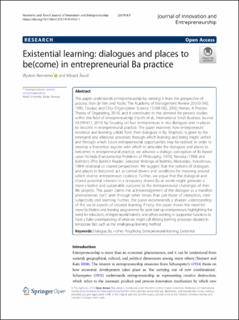| dc.description.abstract | This paper understands entrepreneurship by viewing it from the perspective of process (Van de Ven and Poole, The Academy of Management Review 20:510-540, 1995; Tsoukas and Chia, Organization Science 13:568-582, 2002; Hernes, A Process Theory of Organizing, 2014), and it contributes to the demand for process studies within the field of entrepreneurship (Hjorth et al., International Small Business Journal 33:599-611, 2015) by focusing on four entrepreneurs in situ dialogues and in places to become in entrepreneurial practice. The paper examines how entrepreneurs’ existence and learning unfold from their dialogues in Ba. Emphasis is given to the emergent and relational processes through which learning and being might unfold and through which future entrepreneurial opportunities may be realised. In order to develop a theoretical register with which to articulate the dialogues and places to be(come) in entrepreneurial practice, we advance a dialogic conception of Ba based upon Nishida (Fundamental Problems of Philosophy, 1970), Nonaka (1998) and Bakhtin's (The Bakhtin Reader. Selected Writings of Bakhtin, Medvedev, Voloshinov, 1984) relational or shared perspectives. We suggest that the notions of dialogues and places to be(come) act as central drivers and conditions for meaning around which diverse entrepreneurs coalesce. Further, we argue that the dialogical and shared potential inherent in a temporary shared Ba or world might generate a more creative and sustainable outcome to the entrepreneurial challenges of their life projects. This paper claims the acknowledgement of the dialogue as a manifest phenomenon itself, seen through other lenses than just those of interaction, inter-subjectivity and learning. Further, the paper recommends a sharper understanding of the social aspects of situated learning. Finally, the paper shows the need for more facilitation and training programmes for post-start-up entrepreneurs, highlighting the need for educators, entrepreneurial trainers, and others working in supportive functions to have a fuller understanding of what we might call lifelong learning processes situated in temporary Ba’s such as the small-group learning method. | en_US |

